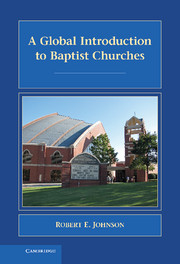Book contents
- Frontmatter
- Contents
- List of Illustrations
- Acknowledgments
- List of Important Baptist Organizations
- Global Baptist Timeline
- Introduction
- PART I FOUNDATIONS
- PART II AGE OF EMERGING BAPTIST DENOMINATIONAL TRADITIONS
- PART III THE FRONTIER AGE
- PART IV AGE OF PROLIFERATING TRADITIONING SOURCES
- 6 Baptists' Evolving Traditioning Sources in Africa, Asia, and Oceania
- 7 Baptists' Evolving Traditioning Sources in Latin America, the Caribbean, Europe, and Eurasia
- 8 Baptists' Evolving Traditioning Sources in North America
- PART V BELIEFS AND PRACTICES
- Index
- References
7 - Baptists' Evolving Traditioning Sources in Latin America, the Caribbean, Europe, and Eurasia
Published online by Cambridge University Press: 05 September 2012
- Frontmatter
- Contents
- List of Illustrations
- Acknowledgments
- List of Important Baptist Organizations
- Global Baptist Timeline
- Introduction
- PART I FOUNDATIONS
- PART II AGE OF EMERGING BAPTIST DENOMINATIONAL TRADITIONS
- PART III THE FRONTIER AGE
- PART IV AGE OF PROLIFERATING TRADITIONING SOURCES
- 6 Baptists' Evolving Traditioning Sources in Africa, Asia, and Oceania
- 7 Baptists' Evolving Traditioning Sources in Latin America, the Caribbean, Europe, and Eurasia
- 8 Baptists' Evolving Traditioning Sources in North America
- PART V BELIEFS AND PRACTICES
- Index
- References
Summary
The themes treated in Part IV have intentionally inverted the traditional Western ordering of Baptist history, which usually is cast as flowing from Europe (especially Britain) to North America, then to the mission fields of Africa, Asia, and Latin America. Although substantial evidence exists to support that arrangement, this schema also tends to obscure the fact that the Baptist world is changing dramatically. In many instances, the mission fields have come of age and are rapidly emerging as mature, vibrant, and fertile centers of Baptist life. This chapter brings four of those worlds together in an uncommon coupling to accentuate the significance and nature of those developments.
At the dawn of the twentieth century, modernism seemed to be gaining ground against the established traditions of philosophy, government, and religion. In Europe, modernism became the entrenched worldview of intellectuals and was hailed as the key to solving humanity's most obstinate problems, such as poverty, disease, unemployment, and crime. Numerous widely embraced movements – like liberalism and neoclassicism – looked positively to the Enlightenment as the source from which their intellectual systems had evolved. These mental frameworks tended to emphasize particular applications of rationality as a means for undermining many long-established assumptions about reality. Thus, appeal was made to Enlightenment thought as a basis for fighting superstition, intolerance, and confessionalism. Freedom, democracy, reason, capitalism, the scientific method, and religious tolerance became the core virtues of this new world, and Western societies were considered the epitome of this unprecedented standard of human achievement.
- Type
- Chapter
- Information
- A Global Introduction to Baptist Churches , pp. 285 - 333Publisher: Cambridge University PressPrint publication year: 2010

